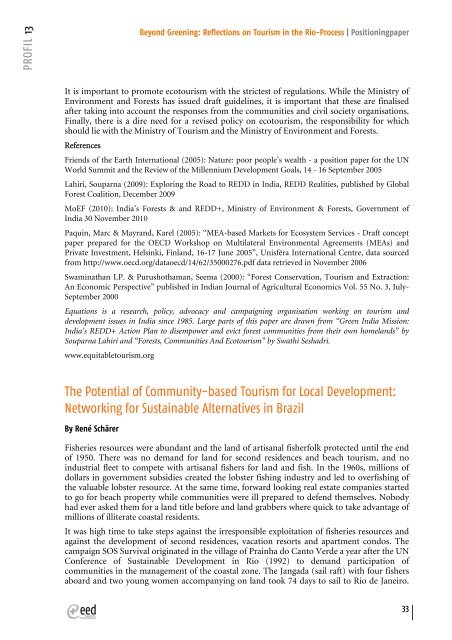Beyond Greening - Tourism Watch
Beyond Greening - Tourism Watch
Beyond Greening - Tourism Watch
Create successful ePaper yourself
Turn your PDF publications into a flip-book with our unique Google optimized e-Paper software.
<strong>Beyond</strong> <strong>Greening</strong>: Reflections on <strong>Tourism</strong> in the Rio-Process | PositioningpaperIt is important to promote ecotourism with the strictest of regulations. While the Ministry ofEnvironment and Forests has issued draft guidelines, it is important that these are finalisedafter taking into account the responses from the communities and civil society organisations.Finally, there is a dire need for a revised policy on ecotourism, the responsibility for whichshould lie with the Ministry of <strong>Tourism</strong> and the Ministry of Environment and Forests.ReferencesFriends of the Earth International (2005): Nature: poor people’s wealth - a position paper for the UNWorld Summit and the Review of the Millennium Development Goals, 14 - 16 September 2005Lahiri, Souparna (2009): Exploring the Road to REDD in India, REDD Realities, published by GlobalForest Coalition, December 2009MoEF (2010): India’s Forests & and REDD+, Ministry of Environment & Forests, Government ofIndia 30 November 2010Paquin, Marc & Mayrand, Karel (2005): “MEA-based Markets for Ecosystem Services - Draft conceptpaper prepared for the OECD Workshop on Multilateral Environmental Agreements (MEAs) andPrivate Investment, Helsinki, Finland, 16-17 June 2005”, Unisféra International Centre, data sourcedfrom http://www.oecd.org/dataoecd/14/62/35000276.pdf data retrieved in November 2006Swaminathan I.P. & Purushothaman, Seema (2000): “Forest Conservation, <strong>Tourism</strong> and Extraction:An Economic Perspective” published in Indian Journal of Agricultural Economics Vol. 55 No. 3, July-September 2000Equations is a research, policy, advocacy and campaigning organisation working on tourism anddevelopment issues in India since 1985. Large parts of this paper are drawn from “Green India Mission:India’s REDD+ Action Plan to disempower and evict forest communities from their own homelands” bySouparna Lahiri and “Forests, Communities And Ecotourism” by Swathi Seshadri.www.equitabletourism.orgThe Potential of Community-based <strong>Tourism</strong> for Local Development:Networking for Sustainable Alternatives in BrazilBy René SchärerFisheries resources were abundant and the land of artisanal fisherfolk protected until the endof 1950. There was no demand for land for second residences and beach tourism, and noindustrial fleet to compete with artisanal fishers for land and fish. In the 1960s, millions ofdollars in government subsidies created the lobster fishing industry and led to overfishing ofthe valuable lobster resource. At the same time, forward looking real estate companies startedto go for beach property while communities were ill prepared to defend themselves. Nobodyhad ever asked them for a land title before and land grabbers where quick to take advantage ofmillions of illiterate coastal residents.It was high time to take steps against the irresponsible exploitation of fisheries resources andagainst the development of second residences, vacation resorts and apartment condos. Thecampaign SOS Survival originated in the village of Prainha do Canto Verde a year after the UNConference of Sustainable Development in Rio (1992) to demand participation ofcommunities in the management of the coastal zone. The Jangada (sail raft) with four fishersaboard and two young women accompanying on land took 74 days to sail to Rio de Janeiro.33












